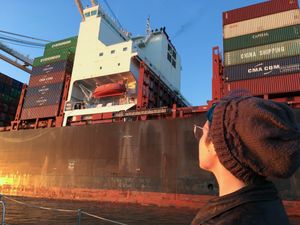When I explore infrastructure sites, I am filled with a mix of exaltation and terror. In 2018, a friend took me through the Port of Oakland on his sailboat, where we watched a container ship unload. It made me acutely aware of just how small I was: a mere speck of dust in the grand workings of some great machine. The sheer magnitude of it all – the boat, the oceans it traverses, the megaports, the millions of containers, and on and on back to the mines where ore is extracted – sprawled beyond my comprehension, inspiring a creeping horror.
Facing the goliath manifestations of industry is an invitation into the sublime. The 18th-century philosopher Edmund Burke called the sublime a state of suspended motion, inspiring awe mixed with horror. When looking at an object as large as a container ship, one’s mind is overcome by its bewildering scale; all other thoughts are pushed aside. That evening, as the APL Columbus filled my view entirely, it also filled my mind entirely. Since then, thinking through what it all means – the movements of any given ship, the trade flows that direct it, the bilge water and exhaust – has more or less consumed my life.
Industrialization spans the globe like a vast Rube Goldberg machine, producing an ever-increasing volume of stuff. I am ambivalent about this – the products and systems we build are incredible, but they are also ingrained with our folly. Writing about these tensions helps me make sense of them. I can profile a shipping company, or research which countries buy and sell a commodity, and piece by piece keep that creeping fear at bay.
-Hillary Predko
The most clicked link from last week's issue (~8% of opens) was a story about a fitness equipment manufacturer that managed to fulfill a 500+ metric ton order for the US Army in mere months. In the Members' Slack, James asked Bing's chatbot what exactly community members should call ourselves. It suggested Scopers, Scopists, SOWmates, and workies. 🤔 We'll keep workshopping it.
JOBS.
- Nevados Engineering is hiring an embedded hardware engineer in SF.
- Overstory is hiring a remote quality engineering lead.
- Aspen Aerogels is hiring a senior maintenance manager in Register, GA.
- The SAIC Textile Resource Center is hiring a director in Chicago.
- Wallbox Chargers is hiring a hardware QA engineer in Barcelona, Spain.
- More jobs on Scope of Work's job board; you can promote the role you're hiring for here.
PLANNING & STRATEGY.
In my schools and city, recycling was framed as an easy way to help the environment – the way we could all do our part. But that's far from the whole picture. As Adam Minter details in Junkyard Planet, recycling is also a global commodities market and the big players, like municipalities and the recycling companies they contract, are motivated primarily by business interests. This isn’t a bad thing – if recyclers can make money, things get recycled. This frame has been clarifying, opening the black box of the blue bin.
When I took that trip to the Port of Oakland in 2018, I was researching Operation National Sword, a Chinese policy that upended the global recycling industry. Prior to 2017, China was the largest importer of scrap material from North America and Europe. Recyclable materials collected from city streets were baled, containerized, and shipped to China. National Sword effectively ended this. Some materials are technically still allowed, but strict contamination guidelines make it nearly impossible for materials recovery facilities (known as MRFs, which rhymes with Smurfs) to export commodity recyclable materials to China.
Domestic concerns about unregulated recycling had sprung up in China, attributed by some industry professionals to the documentary Plastic China. The film detailed grim conditions at a small recycling plant and went viral before being scrubbed from the Chinese internet. After National Sword was implemented, North American and European MRFs struggled and often failed to find markets for the materials they collected, leading to a wave of articles about recyclables being landfilled. That same framing I had learned in school – that recycling is first and foremost an environmental act – led many to interpret this as evidence that recycling had outright failed.
The market did adjust, but change takes time. In the intervening years, the loss of the most popular export destination has forced major shifts in the industry. This OECD report on the plastic scrap industry describes a complex market, where Southeast Asian countries have emerged as the largest export destinations, and scrap trade between OECD countries has increased. Further, National Sword kicked off major investment in domestic recycling capacity in the United States. American MRFs have invested heavily in automated systems to separate materials more effectively – like these optical sorting robots, which use machine vision to identify and separate materials.
MAKING & MANUFACTURING.
Growing up in the 90s, computers had already embedded themselves into the home. Each new machine in my house inevitably outperformed the previous model wildly. By the time I learned about Moore’s Law as a teenager in the aughts, cutting-edge chips had about 100 million transistors, up from a few thousand in the 70s. The upward swing of computing power has permeated the world around me so seamlessly, I accepted Moore’s Law as some fundamental physical truth, as unyielding as the laws of thermodynamics.
Of course, this is not the case. I am enjoying how Chip War focuses on the process engineering and business decisions that enabled fabs to fit more transistors on chips. In discussing Charles Sporck, a GE engineering manager turned Fairchild manager, author Chris Miller writes:
In an industry full of brilliant scientists and technological visionaries, Sporck's expertise was in wringing productivity out of workers and machines alike. It was only thanks to tough managers like him that the cost of computing fell in line with the schedule Gordon Moore had predicted.
I was surprised to learn just how early semiconductor manufacturing expanded overseas: Sporck spearheaded a Fairchild facility in Hong Kong in 1963! The industry globalized “decades before anyone had heard of the word,” seeking lower labor costs to keep the price of chips down. While there are ongoing national security concerns about the lack of domestic fabs today, Gordon Moore’s 1965 prediction might not have become Moore’s law without those early production decisions.
Gordon Moore was a pillar of the semiconductor industry. He was one of the "traitorous eight," who in 1957 left Shockley Semiconductor to found Fairchild Semiconductor, and he went on to found Intel in 1968. He passed away last week at 94.
MAINTENANCE, REPAIR & OPERATIONS.
I enjoyed this virtual tour of the Svalbard Global Seed Vault, a repository co-managed by the Norwegian government, the Crop Trust, and the gene bank NordGen. Deep in the arctic, the vault protects the means to restart agricultural production in the event of a disaster. The concrete entrance juts out of the side of a mountain like a brutalist crystal growing from the tundra. It leads into a series of utilitarian spaces: a sparse entry room, a watertight access tunnel, a foyer dubbed “the cathedral,” and finally the three seed chambers.
The interior of the seed chambers is outrageously mundane, with simple steel shelving stacked with carefully labeled boxes that house over a million samples. While the facility has inspired conspiracy theories, I think the project is kind of utopian. At Svalbard, our best facsimile of the world’s plant diversity lays dormant. It’s a love letter to the future, a promise that we will care if a crop fails. Seeds, by their nature, are full of potential – and diligent volunteers from all over the world trek to the arctic to deposit seeds in the vault and shore up that potential for future generations.
Also see this database of the seeds, the Seed Vault’s Flickr page, and this episode of 99 Percent Invisible.
DISTRIBUTION & LOGISTICS.
A new essay by Miriam Posner takes a deep dive into digitization and logistics and explores the implications of freight carriers’ goal to launch automated, crewless vessels. Huge containerships already run with tiny crews – for example, the 397 m, 14,770+ TEU Emma Mærsk operates with 13 crew members.
Posner points to seafarer abandonment as an example of freight carriers’ “willingness to cast aside human welfare in the pursuit of short-term profits.” If a ship accrues too much debt or is no longer profitable to operate, companies sometimes decide to abandon it, along with the cargo and seafarers who are left without wages or provisions. These incidents have been on the rise for the last five years, impacting 1,682 workers in 2022. In the last 20 years, unpaid wages to these workers have exceeded $40 million. Mohammed Aisha’s story is a particularly extreme example, as the Syrian sailor was trapped alone on a boat on the Suez Canal for four years after his ship was abandoned.
I clearly have a soft spot for container ships, but I would hate to see this category of maritime jobs eliminated. It’s always a joy to watch merchant marines talk about their work, and despite the aforementioned risks, it’s a great career. Mohammed, the man who was isolated and trapped for four years, took the captain’s exam when he returned home! He didn’t want to change industries; the sea was calling. The International Transport Workers’ Federation, which represents seafarers, doesn’t see immediate cause for alarm. In a position paper on automation, they anticipate changes following similar patterns as past transitions in the maritime industry, and plan to focus on technology training for workers.
INSPECTION, TESTING & ANALYSIS.
The desire to have perfect data, and thus the ability to make perfect decisions, is an old one. I am delighted by the optimism of Buckminster Fuller’s world peace game from the 1960s, which came to be known as just the World Game. The game is a utopian overhaul of war games (to be played on top of a huge Dymaxion map), and players collaborate to “make the world work, for 100% of humanity, in the shortest possible time, through spontaneous cooperation, without ecological offense or the disadvantage of anyone.”
In 1972, Fuller founded the World Game Institute with several collaborators and ran workshops around the world; vintage photos of the game in action are pretty fun. Bucky imagined the game would be transformative – we’d all go in for spontaneous cooperation and world peace. Unfortunately, his predictions have fallen short, but this open access thesis paper tackles how to program a problem-solving engine like the World Game with contemporary data sources.
SCOPE CREEP.
- A beautiful tool for generating color palettes.
- Sam Zeloof, famous for fabricating chips at home from the time he was a teenager, and Jim Keller, an experienced microprocessor engineer who’s worked at AMD and Apple, are starting a new semiconductor fab. Very little information is available, but the Hacker News comments are worth scrolling through.
Thanks as always to Scope of Work’s Members and Supporters for making this newsletter possible. Also, a big thanks to Kate for recommending me to Pier 9, and to everyone at the pier who I worked with. If you’re ever able to take a few months to focus on the problems you’re most interested in, take the opportunity!
Love, Hillary
p.p.s. - We care about inclusivity. Here's what we're doing about it.




